Pros and cons in stampede reports
Updated: 2015-01-07 07:38
(China Daily USA)
|
||||||||
Editor's Note: The deaths of 36 people in the Shanghai stampede on New Year's Eve have sparked a serious public debate over how it has been reported. Two open letters posted on the Internet, along with a media scholar's comment, analyze the controversy reflected in the debate. Excerpts:
Open letter From Fudan Alumni
Focus should not be on one victim
Many say 2015 has begun on a tragic note. For Fudan University students, the year could not have begun on a sadder note, because one of the victims was from the Shanghai-based university.
Perhaps an even sadder part of the tragedy is that some media reports have given detailed information on the Fudan University student, including her age, hometown, major, interest in traditional costumes, her message board on social network, and even quotes from her boyfriend's online postings.
According to regulations and media ethics, journalists have the responsibility of reaching objective and fair news to the public, and respecting people's sentiments. A socially conscious journalist will tell readers or viewers what exactly has happened or, in this case, advise them how to prevent (or avoid) repetition of such tragedies. News reporting does not have any scope for personal views.
Although 36 people, many of them students, died in the crush, the media report has focused on one of the victims, that is, the female student of Fudan University. The continuous media focus on the Fudan University student is rubbing salt on her family's wounds. The media should understand this and spare her parents the ignominy of reading the not-so-pleasant details of their daughter's life.
We, the students of Fudan University, condemn the sensational reports on our college mate. We want her family and friends to be protected from the glare of the media. And we hope the media will respect the feelings of her family.
Thank you.
Media does its duty
To Fudan students:
It's always easy to accuse others of occupying the moral high ground, because that saves us the trouble of trying to resolve issues. In this age of the Internet, everyone can choose to make public part or all of his/her information, which is not considered private.
We have access to all kinds of social networks, and the information they contain may be used by all, including the media. Besides, our social activities inevitably involve exchange of information.
In the stampede case, journalists quoted information on one of the female victims that were openly available on the Internet. Journalists also interviewed the victim's family and classmates.
No one has ever hacked her e-mail account or tapped her friends' telephones. So, how did journalists violate privacy?
Still, people have the right to protect their information from being made public.
Besides the open letter, some online posts signed by Fudan University students said that the media should not interview her family (and that her family should not give interviews to the media).
Do not demonize journalists. If her family members want the victim to be remembered as a live person instead of a cold number, they have the right to talk to the media and narrate their part of the story, but her schoolmates have no right to say what the media "should" or "should not" do.
One thing is certain: the whole process has nothing to do with Fudan students, who claim to be overtly concerned about her parents and other family members, but who have never inquired about their opinions. Please do not act like a bureaucrat before you become one.
From an anonymous reporter
Journalists mostly play by rules
Fudan University alumni have criticized journalists for filing sensational reports on the Shanghai tragedy. The alumni said journalists used the stampede to attract eyeballs. But the fact is that, journalists are doing their job and sharing information with the public.
After such tragedy, people expect journalists to inform them about the details. They want the media to be their agents of information. In this sense, journalists act as a bridge between the people and events. And that is exactly what journalists should do.
Of course, journalists have to have high morals. But more than anything else, they should exercise discretion while reporting on sensitive issues. An unwritten rule in journalism is to share the grief of people who have lost their loved ones.
Besides, the Chinese government has laid out the ethical code for journalists, which requires them to share the feelings of victims and their families, and avoid hurting them during interviews.
Journalists across the world have established some detailed principles, which includes not causing pain to victims, not using words or expressions that could hurt the victims' families, and avoiding the publication of bloody images and close-up of victims.
Zhuang Yongzhi is an associate professor of journalism studies at Nanjing University and a former anchor on CCTV.
(China Daily USA 01/07/2015 page12)

 Giraffes, elegant dancers
Giraffes, elegant dancers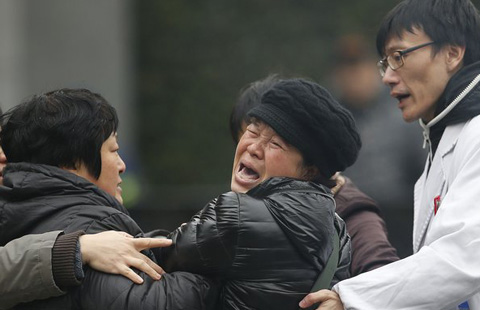
 Memory of stampede victims honored on 7th day
Memory of stampede victims honored on 7th day
 Russian airline stewardess flying over China
Russian airline stewardess flying over China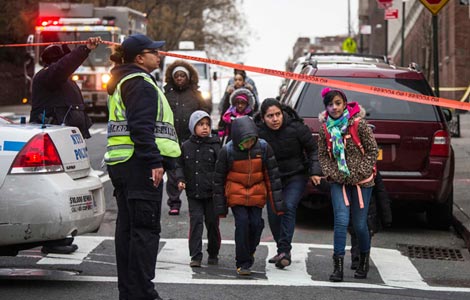
 Two New York policemen shot after armed robbery
Two New York policemen shot after armed robbery
 Alabama puts spotlight on China in 2015
Alabama puts spotlight on China in 2015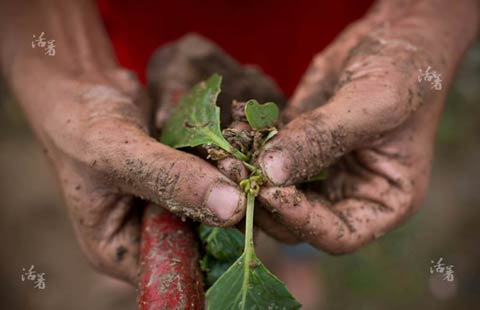
 Young men farm for the future
Young men farm for the future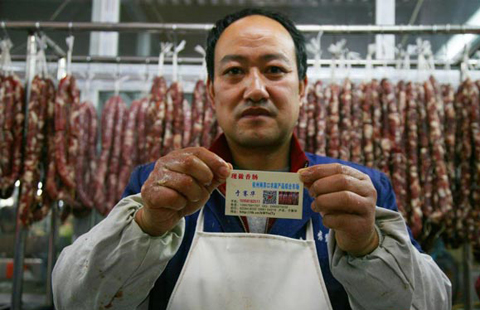
 Sausage seller uses mobile payment for better hygiene
Sausage seller uses mobile payment for better hygiene
 Top 10 biggest recall of cars in China in 2014
Top 10 biggest recall of cars in China in 2014
Most Viewed
Editor's Picks

|
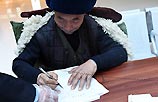
|

|

|

|
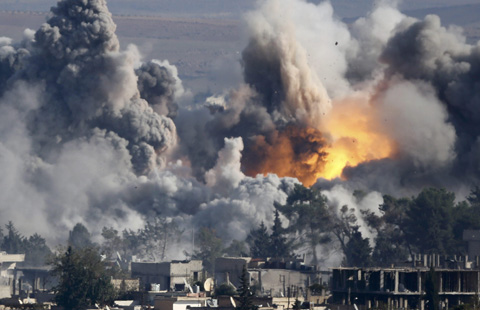
|
Today's Top News
Two New York policemen shot after armed robbery
US stands by plan to pull troops from Afghanistan
ZTE talks mobile at CES
Top 10 biggest recall of cars in China in 2014
Two New York City police officers shot and wounded
NYC rallies around Liu family
Community rallies around Liu family
Stock link bid for HK, Shenzhen
US Weekly

|

|








